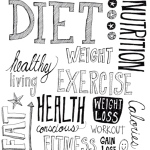Over the next few weeks, we’ll be posting 10 myths about dieting from the article by Michael Mosley in The Times.
Claim 5. when you stop eating for a while your metabolic rate slows down as your body tries to conserve your fat stores.
Fear of going into “Starvation mode” is common and yet, at least from an evolutionary perspective, it makes little sense. Our remote ancestors often had to go without food for a while and if, every time this happened, they had simply curled up on the floor of their cave and waited for pizza to be delivered they would have gone extinct. Only during periods of prolonged famine would it make sense to slow the metabolism down, wait for better times to come.
The myth seems to be based, in part, on the Minnesota starvation experiment, a study carried out during World War Two in which young volunteers lived on extremely low calorie diets for up to six months. The purpose of the study was to help scientists understand how to treat victims of mass starvation in Europe.
After prolonged starvation there was a drop in body temperature and heart rate, suggesting that their basal metabolic rate (the energy burnt by your body when you are at rest) had fallen. This, however, was an extreme situation.
A more recent experiment on the effects of short term calorie restriction, Resting energy expenditure in short-term starvation, produced very different results. In this experiment they took 11, healthy volunteers and asked them to live on nothing but water for 84 hours.
The researchers found that the volunteers’ basal metabolic rate went up while they were fasting. By day 3 it had risen, on average, by 14%.
One reason for this may have been the significant rise they detected in a catecholamine called noradrenaline, which is known to burn fat.
If they had continued then, I’m sure, the volunteers’ metabolic rates would eventually have fallen, not least because they would have begun to lose significant amounts of weight. But, certainly in the short term, there is no evidence that starvation mode is anything other than a myth.






2:45 pm
3 Jul 14